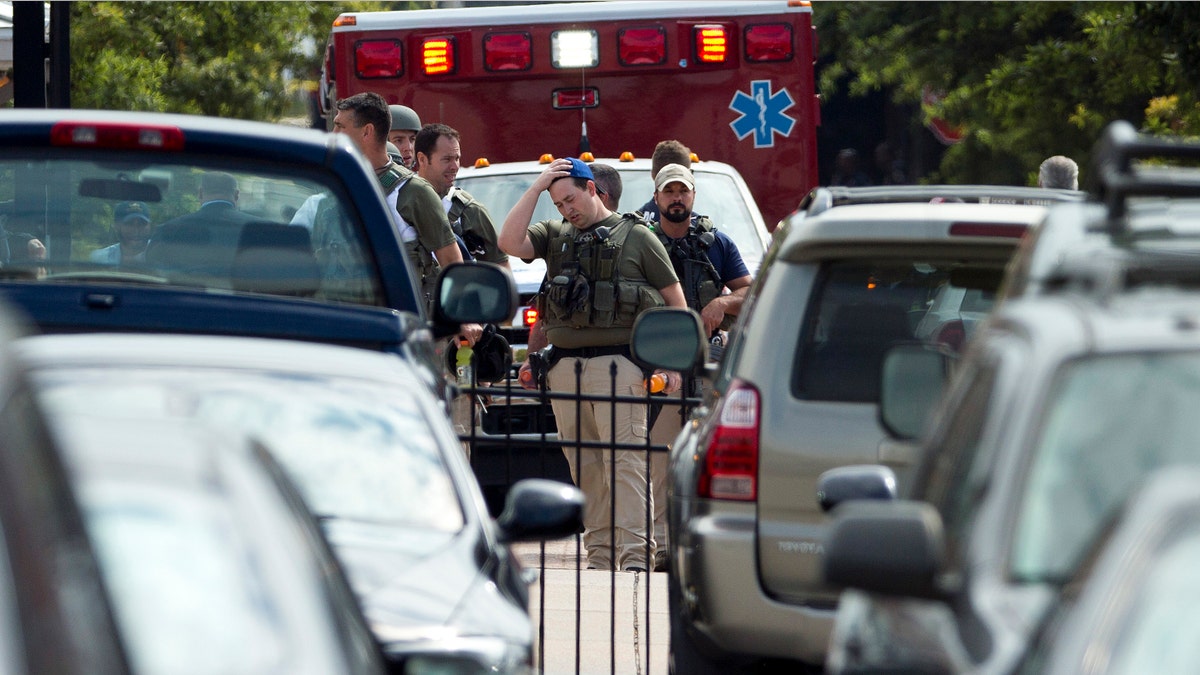
September 16, 2013: Heavily armed U.S. marshals walk from the Washington Navy Yard after a shooting by gunman Aaron Alexis. (Reuters)
The independent contractor that hired Washington Navy Yard shooter Aaron Alexis knew he was showing signs of mental illness, but failed to report the finding—despite rules requiring them to do so, according to congressional testimony Thursday.
Stephen Lewis, a Deputy Director for the Office of the Undersecretary of Defense told the Senate Committee on Homeland Security and Governmental Affairs that it was determined that the company, The Experts, was well aware of Alexis’s mental instability and failed to report the information.
In addition, the contractor failed to seek out a copy of a police report for a 2004 arrest in Seattle when Alexis allegedly shot out the tires of a car in what was described as a rage “blackout.” However, his employer was not obligated to seek out the report under current criteria for background checks on an individual.
“It was not in our view, a case of malfeasance on the part of the contractor. They did what they were supposed to do,” Brenda Farrell, Director of Defense Capabilities and Management at the Government Accountability Office said during her testimony.
Thursday’s hearing was meant to examine the adequacy of background checks and the security clearance system for federal employees and contract workers. It comes as officials investigate how Alexis, a 34-year-old defense contractor, was able to acquire and maintain a secret clearance despite a series of violent outbursts, repeated brushes with the law and concerns about his mental health.
The former Navy reservist killed 12 people inside the Navy Yard building where he worked Sep. 16 before being fatally shot by police. He entered the property with a valid security badge.
President Barack Obama has also ordered the White House budget office to examine security standards for government contractors and employees across federal agencies. Concerns about weaknesses in the security clearance system have surfaced not only with Alexis, but also with National Security Agency leaker Edward Snowden and Army Pvt. Bradley Manning, currently imprisoned for leaking classified documents.
One revision discussed Thursday is the process by which security clearance holders are re-investigated. That currently happens every five years for those with top secret clearances and every 10 years for holders of secret clearances.
A new tool emerging from an executive order would allow that review to happen at any time, including automated records checks of government and commercial databases, said Brian Prioletti, an assistant director in the Office of the Director of National Intelligence.
Defense officials have said that when Alexis applied for security clearance with the Navy, he lied about the 2004 arrest in Seattle.
An FBI fingerprint check revealed the arrest, but an investigative report from an Office of Professional Management contractor omitted the fact that Alexis had fired shots, court records in Seattle did not detail the circumstances of the arrest, and no charges were filed.
Alexis was granted a secret clearance in 2008 and held onto it despite multiple subsequent encounters with police, including a 2010 arrest in Texas, where a neighbor told police she was nearly struck by a bullet fired from his downstairs apartment. No charges were filed.
Elaine Kaplan, acting director of the OPMt, said her staff has advised her that Alexis's file "complied with all applicable standards," but that OPM's office of internal oversight and compliance is reviewing the matter.
One month before the Navy Yard shooting, Alexis called police in Rhode Island to the hotel where he was staying and complained about voices wanting to harm him, according to the police report. The FBI has said he believed he was being bombarded with extremely low frequency radio waves.
The Associated Press contributed to this story




